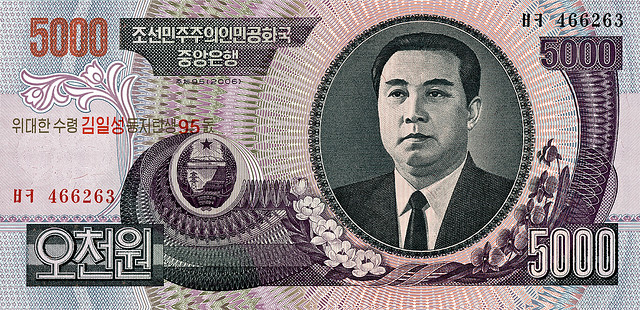Ten P.M. in Pyongyang, all street lights went out. I shined a torch to penetrate the darkness. Two patrolmen spotted the light source and shouted at my direction. In a jitter, I responded in Chinese. After realizing I’m a foreign visitor, they softened their tone and let me pass by. Pyongyang citizens are not allowed to go outside at night. Another thing prohibited by North Korean government is foreign visitors exchanging for Korean People’s Won.
Then how can a foreign traveler make a purchase in Democratic People’s Republic of Korea?
In the past, a separate currency for foreign visitors, also known as foreign exchange certificates, was issued by North Korea’s central bank, including two types — “red won” for visitors from socialist countries and “blue won” for visitors from capitalist countries. Foreign exchange certificates has been abandoned since 2002.
When you travel to North Korea now, in theory, you are not allowed to have North Korean won, but if you want to take something from North Korean back home, you can shop at state-run stores held in hard currency. Goods’ description labels are in English and Chinese, and goods are priced in dollar, Chinese yuan and euro there.
But that is only in theory. In fact, you can trade for Korean People’s won after street lamps going out — in the black market. I have traded Chinese Yuan for Korean People’s Won twice out of three attempts. I first traded 10 yuan ($1.6) for 10 won with two North Korean basketball players. At that time, the official exchange rate of yuan to won was 5:1, and the exchange rate in black market was about 570:1. They knew they made a killing by doing this deal with me — getting around 5,700 won by giving me 10 won.
North Korea did and does tightly control exchange rate. The iconic rate of 2.16 won (Kim Jong-il’s birthday is Feb.16) to U.S. dollar was abandoned in 2001, but the Korean government still extremely overvalues won. That’s why North Korean won in the black market is worth much less than what North Korean government wish it to be.
Then I went to a street shop in the same decoration with other shops distributed sporadically on the street. Bread displayed on the shelves comes from one single place with an identical package. Yellow neon casted dim but warm hue on the shop assistant. The moment I tried to start a conversation, she took a glance over my dangling Nikon D7 and kicked me out.
Last I stepped into a grocery store inside a residential district, which looked very different from prior street shops. A variety of commodities were set at random. I didn’t know whether I was an uninvited guest to this little store or not. But the salesman stood up when he saw me and he seemed to know he could get RMB from me. He was even willing to take the risk of being caught because I obviously offered a good deal. I bought a carton of cigarettes and 5,00 won with 50 yuan ($8.2).
I made my “official” purchase in North Korea at a state-owned store especially running for foreign visitors — I bought an exact same carton of cigarettes as last time in 100 yuan ($16.3). They make won at least looks valuable by over-highly pricing goods to foreigners.
I’ve heard our North Korean tour guide chiding today’s China as faded socialism for dozens of times. And that was the one and only occasion when I thought “faded” was a positive word.
